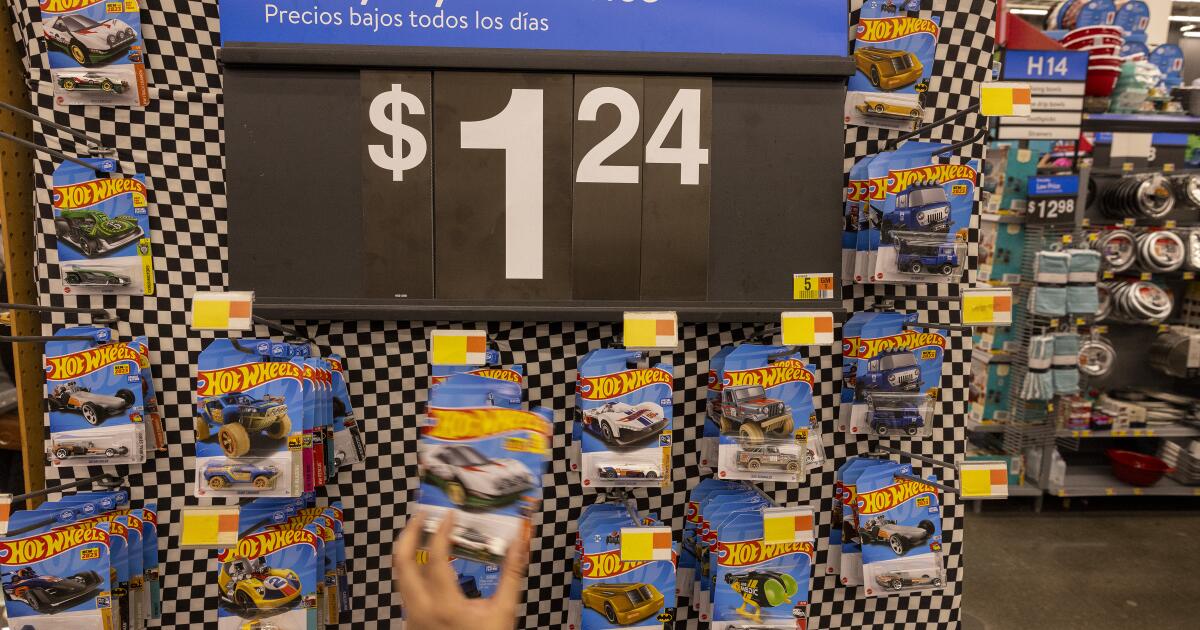The price tag is going digital.
Walmart is leading the charge into the future of in-store shopping as the the mega-retailer and other chains, including grocery giant Kroger, are replacing paper-and-ink price tags with electronic labels that can be used to quickly raise or lower the price of an item.
Electronic shelf labels are already common in Europe and will become wider spread in the U.S., with Walmart planning to implement the labels in 2,300 stores by 2026. Several Walmarts in California already feature the new technology, a spokesperson said.
It is a transition that’s prompted concerns that the technology opens the door to price gouging despite retailers’ assurances that the labels won’t be used to jack up costs.
With the electronic labels, employees can update prices on products in a few clicks, sparing them the time-consuming task of making printed labels and putting them in place, retailers say. But the increased efficiency has been met with wariness among consumer advocates, including U.S. Sens. Elizabeth Warren (D-Mass.) and Bob Casey (D-Pa.), who worry that the ability to easily change prices paves the way for grocers to take advantage of customers.
“These digital price tags may enable Kroger and other grocery chains to transition to ‘dynamic pricing,’ in which the price of basic household goods could surge based on the time of day, the weather, or other transitory events,” the senators wrote in a letter to Kroger Chief Executive Rodney McMullen.
Dynamic pricing could mean raising the cost of ice cream on a hot day, for example, or quickly raising the cost of water and canned goods before an upcoming storm. Kroger and Walmart said they have no plans to implement dynamic pricing, and added that electronic shelf labels will only be used to help lower costs.
“Kroger’s business model is to lower prices over time so that more customers shop with us,” a Kroger spokesperson said. “Any test of electronic shelf tags is to lower prices more for customers where it matters most. To suggest otherwise is not true.”
A Walmart spokesperson said updates to the electronic tags will be used to reflect lower prices for items on sale or final clearance. Prices will not change throughout the day, she said.
Walmart’s low prices are serving the company well as consumers navigate inflation and seek bargains for everyday goods. On Thursday, the company released its earnings report for the second quarter, which exceeded expectations. Comparable-store sales — which include sales online and at stores open for at least 12 months — rose 4.2% in the U.S. That compares with 3.8% in the first quarter and 4% in the fourth quarter last year. The company’s stock price rose 6.5% on Thursday to $73.18.
Grocery industry analyst Phil Lempert said the digital tags will help save time and money amid a labor shortage, but they could lead grocery chains down a slippery slope.
“If you can make it electronic you can take a lot of costs out of the system, and that’s great,” Lempert said. “But once that’s installed, and regardless of what any retailer is going to say, it’s now easy to change prices.”
Santiago Gallino, a professor specializing in retail management at the University of Pennsylvania, said he hasn’t seen signs that retailers plan to use electronic shelf labels for surge pricing.
“In my conversation with retailers, it’s clear that those who are pushing towards this technology are mainly trying to drive efficiency up in the stores and try to reduce costs,” Gallino said. “Grocery retailers operate on very thin margins, so every time they find technology that can help them save in labor, they will do that.”
What grocery stores save in labor they may lose in customer trust and loyalty, however, said RetailWire CEO Dominick Miserandino.
“Consumers are exceptionally skeptical,” he said. “When most of the consumer reaction to any product seems to be overwhelmingly negative, it’s probably a product that one might want to reevaluate quickly.”
With years of high inflation having pushed up prices for everyday goods, consumers are especially wary of price gouging, Miserandino said. Fast-food chain Wendy’s faced heavy backlash earlier this year over new digital menu boards and the prospect of
dynamic pricing.
Along with the senators’ letter, Vice President Kamala Harris underscored the political potency of the issue with word she plans to voice support for a federal ban on corporate price gouging on groceries in a speech later this week, the New York Times reported.
The Associated Press contributed to this report.

